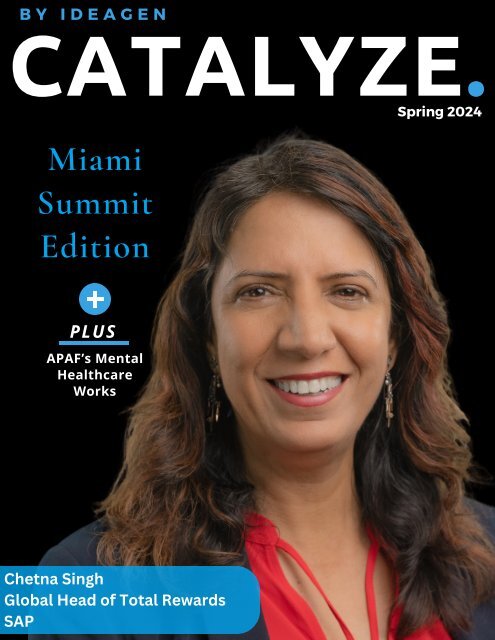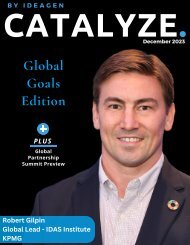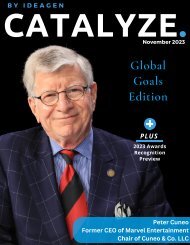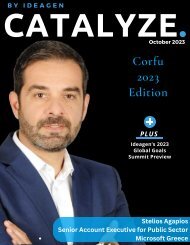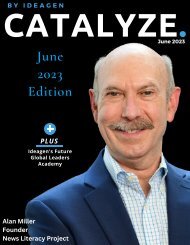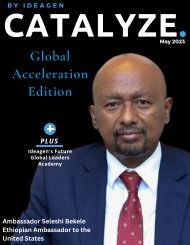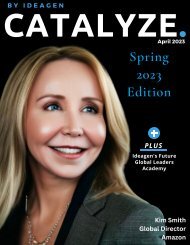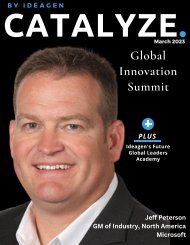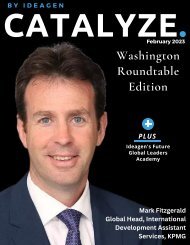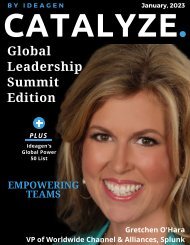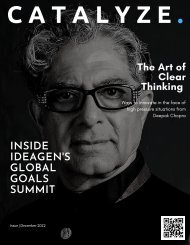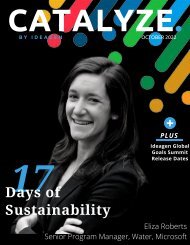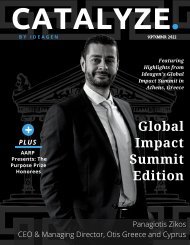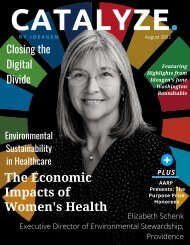Ideagen Global - Catalyze Magazine - Spring 2024
With Ideagen's extensive member network and influential platform, Catalyze Magazine serves as an aggregate for all the content, events, articles, and collaboration that we do. It is a monthly magazine where you will find transcriptions from Ideagen events, content, articles, and information surrounding how we are completing our mission. With this magazine, we want to highlight the nature of cross-sector collaboration and how we infuse it into our daily mission on a global scale. Ideagen's monthly Catalyze Magazine is back with our Spring 2024 edition. Inside, view conversations from the AI, Health, Tech, & Finance Summit hosted in Miami, Florida! This months covers features speakers: Chetna Singh, BJ Moore, Ruth Hunter, David Lloyd, Manoli & Nicole Lagos, Bill Novelli, Dr. César Lara, donna Bungard, Conor Walsh, Brian Hecker, & Andrew Leedham.
With Ideagen's extensive member network and influential platform, Catalyze Magazine serves as an aggregate for all the content, events, articles, and collaboration that we do. It is a monthly magazine where you will find transcriptions from Ideagen events, content, articles, and information surrounding how we are completing our mission. With this magazine, we want to highlight the nature of cross-sector collaboration and how we infuse it into our daily mission on a global scale.
Ideagen's monthly Catalyze Magazine is back with our Spring 2024 edition. Inside, view conversations from the AI, Health, Tech, & Finance Summit hosted in Miami, Florida!
This months covers features speakers: Chetna Singh, BJ Moore, Ruth Hunter, David Lloyd, Manoli & Nicole Lagos, Bill Novelli, Dr. César Lara, donna Bungard, Conor Walsh, Brian Hecker, & Andrew Leedham.
Create successful ePaper yourself
Turn your PDF publications into a flip-book with our unique Google optimized e-Paper software.
B Y I D E A G E N<br />
CATALYZE.<br />
<strong>Spring</strong> <strong>2024</strong><br />
Miami<br />
Summit<br />
Edition<br />
PLUS<br />
APAF’s Mental<br />
Healthcare<br />
Works<br />
Chetna Singh<br />
<strong>Global</strong> Head of Total Rewards<br />
SAP
B Y I D E A G E N<br />
CATALYZE.<br />
<strong>Spring</strong> <strong>2024</strong><br />
Miami<br />
Summit<br />
Edition<br />
PLUS<br />
APAF’s Mental<br />
Healthcare<br />
Works<br />
BJ Moore<br />
CIO & EVP of Real Estate Strategy & Operations<br />
Providence
B Y I D E A G E N<br />
CATALYZE.<br />
<strong>Spring</strong> <strong>2024</strong><br />
Miami<br />
Summit<br />
Edition<br />
PLUS<br />
APAF’s Mental<br />
Healthcare<br />
Works<br />
Ruth Hunter<br />
Senior Director of Team Development<br />
Miami Heat
B Y I D E A G E N<br />
CATALYZE.<br />
<strong>Spring</strong> <strong>2024</strong><br />
Miami<br />
Summit<br />
Edition<br />
PLUS<br />
APAF’s Mental<br />
Healthcare<br />
Works<br />
David Lloyd<br />
Solutions Architect Team Lead<br />
Amazon Web Services
B Y I D E A G E N<br />
CATALYZE.<br />
<strong>Spring</strong> <strong>2024</strong><br />
Miami<br />
Summit<br />
Edition<br />
PLUS<br />
APAF’s Mental<br />
Healthcare<br />
Works<br />
Manoli Lagos<br />
Co-Founder & CEO<br />
The Living Fuel Consulting
B Y I D E A G E N<br />
CATALYZE.<br />
<strong>Spring</strong> <strong>2024</strong><br />
Miami<br />
Summit<br />
Edition<br />
PLUS<br />
APAF’s Mental<br />
Healthcare<br />
Works<br />
Nicole Lagos<br />
Co-Founder<br />
The Living Fuel Consulting
B Y I D E A G E N<br />
CATALYZE.<br />
<strong>Spring</strong> <strong>2024</strong><br />
Miami<br />
Summit<br />
Edition<br />
PLUS<br />
APAF’s Mental<br />
Healthcare<br />
Works<br />
Bill Novelli<br />
Professor Emeritus & Founder, Georgetown Business For Impact<br />
Center & Co-Chair, Coalition For Trust in Health & Science
B Y I D E A G E N<br />
CATALYZE.<br />
<strong>Spring</strong> <strong>2024</strong><br />
Miami<br />
Summit<br />
Edition<br />
PLUS<br />
APAF’s Mental<br />
Healthcare<br />
Works<br />
César Lara M.D.<br />
Owner, César A. Lara, M.D. | Center For Weight<br />
Management & Fire and Stone Shamanic Healing
B Y I D E A G E N<br />
CATALYZE.<br />
<strong>Spring</strong> <strong>2024</strong><br />
Miami<br />
Summit<br />
Edition<br />
PLUS<br />
APAF’s Mental<br />
Healthcare<br />
Works<br />
Donna Bungard<br />
Sr. Marketing Accessibility Program Manager<br />
Indeed
B Y I D E A G E N<br />
CATALYZE.<br />
<strong>Spring</strong> <strong>2024</strong><br />
Miami<br />
Summit<br />
Edition<br />
PLUS<br />
APAF’s Mental<br />
Healthcare<br />
Works<br />
Conor Walsh<br />
Co-Founder & Principal<br />
Decentralized Labs
B Y I D E A G E N<br />
CATALYZE.<br />
<strong>Spring</strong> <strong>2024</strong><br />
Miami<br />
Summit<br />
Edition<br />
PLUS<br />
APAF’s Mental<br />
Healthcare<br />
Works<br />
Brian Hecker<br />
Senior Director of Basketball Analytics and Innovation<br />
Miami Heat
B Y I D E A G E N<br />
CATALYZE.<br />
<strong>Spring</strong> <strong>2024</strong><br />
Miami<br />
Summit<br />
Edition<br />
PLUS<br />
APAF’s Mental<br />
Healthcare<br />
Works<br />
Andrew Leedham<br />
Author & Performance Coach<br />
Unstoppable Self Confidence
TABLE OF CONTENTS<br />
01<br />
02<br />
03<br />
04<br />
05<br />
06<br />
07<br />
08<br />
09<br />
10<br />
11<br />
Chetna Singh<br />
<strong>Global</strong> Head of Total Rewards, SAP<br />
BJ Moore<br />
CIO & EVP of Real Estate Strategy & Operations, Providence<br />
Ruth Hunter<br />
Senior Director of Team Development, Miami Heat<br />
David Lloyd<br />
S o l u t i o n s A r c h i t e c t T e a m L e a d , A m a z o n W e b<br />
S e r v i c e s<br />
Manoli & Nicole Lagos<br />
Founders & Operators, The Living Fuel Consulting<br />
Bill Novelli<br />
Professor Emeritus & Founder, Georgetown Business For Impact Center<br />
& Co-Chair, Coalition For Trust in Health & Science<br />
César Lara M.D.<br />
Owner, César A. Lara, M.D. | Center For Weight Management & Fire<br />
and Stone Shamanic Healing<br />
Donna Bungard<br />
Sr. Marketing Accessibility Program Manager, Indeed<br />
Conor Walsh<br />
Co-Founder & Partner, Decentralized Labs<br />
Brian Hecker<br />
Senior Director of Basketball Analytics and Innovation, Miami Heat<br />
Andrew Leedham<br />
Author & Performance Coach, Unstoppable Self Confidence
2 0 2 4 A I , H E A L T H , T E C H , & F I N A N C E S U M M I T<br />
Trends in Total<br />
Rewards and Advice to<br />
Today’s Youth<br />
With Chetna Singh<br />
<strong>Global</strong> Head of Total Rewards<br />
SAP<br />
Chetna Singh of SAP<br />
SAP<br />
George Sifakis: I'd like to zoom in on your role as global head of SAP's Total<br />
Rewards, and specifically, what are the trends coming in <strong>2024</strong> for total rewards<br />
that you'd like to share and that you're implementing at SAP?<br />
Chetna Singh: I would say the topic of skill is a topic that's already here, but it's<br />
still coming like a tsunami. I say this because it's about relevance, it's about staying<br />
agile, and it's about pre-empting what's coming. That's the power of skill. Skill is<br />
not only about doing what is needed today; it's about preparing you for tomorrow.<br />
That's one of the biggest trends, I'd say: The skills framework. Staying relevant for<br />
today and tomorrow, and how the pay models will change to reward you for having<br />
the right skills so that you are creating the right impact and contribution for the<br />
organization.<br />
The second one is about pay equity and transparency; this is a no-brainer, and it<br />
will be a big one. Nobody wants to work for a company where the fundamental<br />
rights of humans are not met, and again, I'm super proud to work with a company<br />
like SAP, which is leading practices in pay equity and pay transparency. Josh<br />
Bersin has published our research, and we've been acknowledged as a leader in pay<br />
transparency and equity. We use technology to create the right fundamental system<br />
where you're able to have a fair and inclusive culture and a system for your<br />
workforce because it matters.<br />
CATALYZE MAGAZINE | 1
T R E N D S I N T O T A L R E W A R D S A N D A D V I C E<br />
T O T O D A Y ’ S Y O U T H<br />
Chetna: Furthermore, as I was talking about staying relevant, I think this<br />
disruption happening in the technology space is asking us to reset or reimagine<br />
employee value proposition. A lot of things have been done in the past, like altering<br />
power structure and huge perks for employees; we need to reimagine those spaces<br />
and channelize in a way that creates a compelling value proposition for our people<br />
and our talent. I believe that these three trends will touch everyone.<br />
Lastly, as I said, transformation is the new norm. You will have to transform your<br />
pay model, your incentives, your pay framework, and your skill framework to<br />
ensure that your business is going in the right direction and that your people and<br />
reward strategy are all intertwined.<br />
George: It's remarkable what you're doing on every level at SAP, and to hear about<br />
your unrelenting focus on the workforce, the employees that are the lifeblood of<br />
SAP is phenomenal. To juxtapose all of these efficiencies with AI, it has become<br />
such a powerful moment, and I think that a healthy, productive workforce is<br />
critical.<br />
I'd like to ask you a question relating to the future and something that I know you're<br />
passionate about, and that is youth. Chetna, what advice do you have for all of the<br />
future global leaders on this planet? The young folks that are maybe still in high<br />
school, and they're looking to you saying, 'Where would I go? What would I want<br />
to do? What does the world look like?' What is the advice you have for them?<br />
CATALYZE MAGAZINE | 2
T R E N D S I N T O T A L R E W A R D S A N D A D V I C E<br />
T O T O D A Y ’ S Y O U T H<br />
Chetna: Yes, and I will use an example of something we all use, which is our<br />
mobile phones. I know that for digital nomads, this is as important as air and water.<br />
Take an iPhone or any other phone, and a few years back, it was the iPhone 4 or 5.<br />
Now, it's the iPhone 14, I think; I don't even know; I've lost count of where we are<br />
now, but I know that they are constantly upgrading to the next level.<br />
And the essence I'm trying to bring is that we should always strive to reach the next<br />
version of ourselves. No success or failure is permanent. You always have to have<br />
the agility to reset and restart your life. I believe in that because I have done it<br />
many times in my life. I've moved countries, started from scratch, and I have again<br />
built on that. I think this will be key: becoming the better version of yourself. Chase<br />
progress, not perfection. And whatever you do today, give your 200% because your<br />
tomorrow will come from what you do today.<br />
CATALYZE MAGAZINE | 3
T R E N D S O F A I I N<br />
H E A L T H C A R E<br />
WITH BJ MOORE<br />
CIO & EVP OF REAL ESTATE STRATEGY &<br />
OPERATIONS<br />
PROVIDENCE HEALTH<br />
Providence<br />
BJ Moore, Providence Health<br />
George Sifakis: As we look at examples of developments and trends in the healthcare industry,<br />
and this is a loaded question with AI looming over us all, what do you think is most relevant to<br />
the youth of today?<br />
BJ Moore: Well, we've delivered health care very similarly for hundreds of years; it's very<br />
episodic. You, as a patient, feel bad. I feel bad as a patient, but I never go to the doctor. Some<br />
people go to the doctor episodically. I think that the message to kids or the youth is that health<br />
care is going to change, and that journey begins very early on. With these advances in artificial<br />
intelligence and large data models, what we're going to be able to do as a health system, the way<br />
youth today manage their health, and the life cycle of that health, that's going to change.<br />
What's great is that youth is probably the quickest to embrace technology. Where we're going<br />
with the digital transformation of healthcare, having it identify, choose, and help to manage<br />
your health more proactively, I think there's a nice alignment there<br />
CATALYZE MAGAZINE | 4
T R E N D S O F A I I N H E A L T H C A R E<br />
George: And that's what we do here at <strong>Ideagen</strong>: shine a non-filtered light on all of these<br />
issues so that folks can come together and bring solutions to the table. That's what we're<br />
always talking about, whether it's at Gates Laboratory, Microsoft, the United Nations, here, or<br />
across the world; we're always talking about bringing solutions to the table. BJ, what you're<br />
doing to transform the entire industry is not a small task. I'd like to ask you if you have one<br />
example of a partnership that you really look to as the model or why you believe in<br />
collaboration; what would it be?<br />
BJ: Before I make this plug, I want to make sure it's known that we've got 5-10 really deep<br />
partnerships, but I'm picking Microsoft. You know I'm biased from working at Microsoft, but<br />
it's really been a long-term partnership. I joined Providence five years ago, and Microsoft has<br />
been with me on that journey the entire time.<br />
It isn't about small transformations. We've been investing for five years, incrementally<br />
improving their products, improving Providence's products, and it's just a great example of<br />
partnership. Microsoft brings its technical expertise and its technical tools, Providence brings<br />
its clinical expertise and its clinical data, and really, that collaboration uniquely allows us to<br />
advance healthcare. While these are companies, the partnership and the advancements we're<br />
doing are for all humanity. It's really a worldwide effort; it isn't just about health.<br />
CATALYZE MAGAZINE | 5
2 0 2 4 A I , H E A L T H , T E C H , & F I N A N C E S U M M I T<br />
Giving Back to the<br />
Community and<br />
Positioning the Heat for<br />
Success<br />
With Ruth Hunter, Senior Director of<br />
Team Development for The Miami Heat<br />
Ruth Hunter, Miami Heat<br />
Heat<br />
George Sifakis: Community engagement is a very significant aspect of many<br />
professional sports teams. How does the Miami Heat team development<br />
department impact and contribute to players' involvement in community outreach,<br />
in addition to the philanthropic efforts made by the team?<br />
Ruth Hunter: I think there are three ways in which we do that here with the Heat.<br />
We have our own pillars that, organizationally, are important to us in the<br />
community: education, social justice, and wellness, with a strong focus on mental<br />
wellness and mental well-being and then a new pillar of ours is sustainability. For<br />
the Heat organization, we have these strong pillars to make sure we're impacting<br />
the community, but we also recognize that our players have different interests and<br />
initiatives personally within the community. We want to make sure that we're<br />
supporting and amplifying what they're doing as well. Things that are important to<br />
them are important to us. Then our Miami Heat Charitable Fund is another arm of<br />
of our organization and another way by which we're able to give back.<br />
George Sifakis: Well, giving back is in your DNA. That's what you do, Ruth, and<br />
I've seen it. You've given your time, talent, and treasure on so many levels because<br />
that's who you are as a leader. I'd like to ask you, how do you combine this<br />
incredible personal and professional knowledge as a player with what is a more<br />
data-driven analytics approach to positioning the Miami Heat for ultimate success?<br />
CATALYZE MAGAZINE | 6
G I V I N G B A C K T O T H E C O M M U N I T Y A N D<br />
P O S I T I O N I N G T H E H E A T F O R S U C C E S S<br />
Ruth: I wish we had the data that they have now when I was playing. I feel like I<br />
would be a much better player than I was. As you know by my personality, I am<br />
analytically wired. I like to understand and make informed decisions, and I think<br />
that's where you're seeing sports really capitalize on this new information and data<br />
that's available to them.<br />
You hear analytics in both positive and negative ways because there's a lot of data<br />
that people are wrestling with how to utilize. Data has to be used by your coaching<br />
staff and your front office, so making sure that you're aligned with providing the<br />
information they're looking for to make their decisions is important. So I love it<br />
because it's the way that I'm wired, but also a way that is helping our organization<br />
as they make decisions on a daily basis.<br />
CATALYZE MAGAZINE | 7
U T I L I Z I N G A I T O O L S<br />
W I T H I N H E A L T H C A R E<br />
WITH DAVID LLOYD<br />
SOLUTIONS ARCHITECT TEAM LEAD<br />
AMAZON WEB SERVICES<br />
AWS<br />
David Lloyd, AWS<br />
George Sifakis: AI is an effective tool for health care and the industry as a whole; it's<br />
happening already. In your eyes, does the implementation help the end user, the patients?<br />
David Lloyd: Absolutely, and it goes back to your earlier questions. We're working in a<br />
regulatory environment, so we have to put the patient and patient safety first. There's so much<br />
opportunity to improve the patient experience, but what we're really doing is launching it<br />
incrementally to be responsible. In terms of patient-facing, what I see with my customers is that<br />
they start by dipping their toes in the water, and there are some simple approaches to patient<br />
education.<br />
Take insurance benefits, for example; they're not simple. If you can ask AI a question and get an<br />
answerback, then that's kind of nice, right? These are complex data sets. Another example might<br />
be a procedure that you're going to have. You can just ask a chatbot and they'll come back with<br />
an answer. Those types of things are efficient and simple. At AWS, we look to invent and<br />
simplify. Our vision for healthcare is that if we can get to the point where clinicians have more<br />
time, it's also going to impact our patients.<br />
CATALYZE MAGAZINE | 8
U T I L I Z I N G A I T O O L S W I T H I N H E A L T H C A R E<br />
David: Hopefully, we'll get to the point where you can have a same-day appointment with your<br />
doctor online and then have your medication delivered to you within a few hours via Amazon.<br />
Maybe it can't all be done virtually, but the majority of the time, it could be; then, for the<br />
exception, you'd go into the office. Another interesting area that I believe is going to impact<br />
patients is drug discovery, and AI is playing a large role in this. We are working with nine of the<br />
top ten pharmaceutical companies, and I expect some major breakthroughs to happen in the near<br />
future, which will benefit all of us.<br />
I've got a lot of use cases, but one of my favorites of AI in our work was from a customer who<br />
was inspired by the Amazon.com reviews. In reviews, we launched a generative AI offering<br />
where you can go to a product that has thousands of reviews, and the AI will summarize it and<br />
inform you of all the key points of these reviews. One of our customers was looking at that and<br />
thought, 'Well, what about the patient experience?' Why can't I take my journey map, which is<br />
when I book my appointment, go to a specialist, and then go into the hospital, and then I'm<br />
discharged?<br />
There's all this data from the interactions, phone calls, notes, and surveys; pull that all together,<br />
and this was their experience. This was good, this wasn't great; then do that for all the patients.<br />
Now you're getting to the point where you think, 'Ok, I can actually affect change for my<br />
patients and give them a positive experience.'<br />
CATALYZE MAGAZINE | 9
Learn more about how the APAF<br />
can help here:<br />
CATALYZE MAGAZINE | 10
How The Living Fuel<br />
Can Help You<br />
With Manoli & Nicole Lagos, Founders and Operators of The Living<br />
Fuel Consulting<br />
Watch their interview here:<br />
View their site here:<br />
TLF.com<br />
George Sifakis: How do you help people<br />
at The Living Fuel?<br />
Manoli Lagos: Well, it comes in our two<br />
approaches. The first is we help people<br />
one-on-one who are sick and tired of<br />
being sick and tired. Whether they're<br />
CEOs, athletes, or just regular people<br />
who want to perform better, we help<br />
people achieve their full optimal health by<br />
utilizing all of the tools, programs, and<br />
coaches on our team.<br />
George: So, when you're looking at each<br />
client, how do you customize and tailor<br />
the approach?<br />
Nicole Lagos: I think everyone is so bioindividual<br />
and so different. What one<br />
person can eat or do may make someone<br />
else not feel so great, so we really try to<br />
take that approach. I also feel we're a<br />
little bit different in this space, because we<br />
take an Eastern and Western approach,<br />
more of an integrative, holistic look.<br />
Then on a larger scale, we work with<br />
businesses just like the business that I<br />
came from and that Nicole came from.<br />
We're working with Deloitte, Slack, and<br />
Free People, massive companies that are<br />
facing the same issues. Their employees<br />
are burnt out and they don't know where<br />
to turn for very customized health advice,<br />
and that's what we do. We come in and<br />
build these custom programs for their<br />
employees.<br />
CATALYZE MAGAZINE | 11
How The Living Fuel Can Help You<br />
Nicole: We're not anti-medication if that's where a client needs to go, but we'll<br />
always try to look at the body as a whole and take that holistic approach first,<br />
which I think we didn't find too much of on our own health journeys. We wanted<br />
to fill in the gap there and just give people that well-rounded look at what was<br />
going on.<br />
George: So you found that generally, what was available to you was more of one or<br />
the other? A holistic or not type of approach?<br />
Manoli: Yes, and it's very cookie-cutter. It wasn't customized, so you couldn't<br />
really find anything specific to you. That same approach that Nicole mentioned is<br />
what we do with businesses. We look at them as individuals. What kind of<br />
problems are their employees facing? Is it productivity? Is it working late hours?<br />
Putting out fires? Is it burnout? Then, we customize programs for those specific<br />
employees, and that's where we've seen real success.<br />
George: How do you deliver the program?<br />
Manoli: We use a team of coaches that implement and deliver. We do it in group<br />
settings and one-on-one settings. We have technology that pushes material out to<br />
the corporations, so it's kind of a bottom up approach, but the companies that<br />
believe in it from the top, the CEOs, those are the ones that have the most success.<br />
Manoli Lagos, The Living Fuel<br />
Nicole Lagos, The Living Fuel<br />
CATALYZE MAGAZINE | 12
H O W T H E L I V I N G F U E L C A N H E L P Y O U<br />
George: Why is that?<br />
Manoli: Because they practice what they preach. When the employees see that their CEO<br />
or C-suite is doing these things, making good choices, and actually prioritizing their sleep,<br />
not sacrificing it, they start to do the same thing and, in return, start performing better.<br />
George: Wow. It's incredibly exciting to hear from you directly about how you're helping<br />
people and companies, but what's next? What's on the horizon for The Living Fuel?<br />
Manoli: We're working on a lot. We want to continue scaling, helping more businesses,<br />
and creating the technology behind our platform to help so many more people. Our reach is<br />
our biggest thing, and our social media has been growing. That's another avenue in which<br />
we can reach people, and we have a podcast platform and series titled "The Living Fuel<br />
Podcast."<br />
Interested in a consultation? Click the link below to learn more!<br />
CATALYZE MAGAZINE | 13
The Effects of<br />
Caregiving For<br />
Millennials and Gen<br />
Xers In The Workplace<br />
With Bill Novelli, Professor Emeritus<br />
& Founder, Georgetown Business For<br />
Impact Center & Co-Chair, Coalition<br />
For Trust in Health & Science<br />
Site<br />
Bill Novelli<br />
George Sifakis: You recently wrote a Fortune article addressing the effects of<br />
caregiving for millennials and Gen Xers within the workplace. Bill, can you kindly<br />
outline your takeaways from this incredible article for our global audience?<br />
Bill Novelli: This is a very important subject. We know that the American<br />
population is aging very rapidly, and we have more and more older adults with<br />
disabilities and chronic illnesses. 1 in 6 full-time workers in our country is a<br />
caregiver, and this is happening across the world. The whole world is aging, except<br />
perhaps for Africa. Many of these caregivers are millennials, Gen Xers, or<br />
experienced workers, and the majority of them are women. These people, these<br />
caregivers, are more likely to report being stressed, working while feeling unwell,<br />
having financial hardship, and they're really suffering in terms of work-life balance<br />
pressures.<br />
They miss work, reduce their work hours, refuse promotions, and even quit the<br />
workforce in order to be caregivers for their family members. They don't feel like<br />
their employers see them. One caregiver we heard from said, "I feel like a hidden<br />
warrior," and that's what they are. They often don't even believe that their<br />
employers have services to support them. I'm part of something called the<br />
Coalition to Transform Advanced Care, or C-TAC, and The Cigna Foundation, and<br />
we studied this to find out how serious the problem is.<br />
CATALYZE MAGAZINE | 14
T H E E F F E C T S O F C A R E G I V I N G F O R<br />
M I L L E N N I A L S A N D G E N X E R S I N T H E<br />
W O R K P L A C E<br />
Bill Novelli: These caregivers struggle with a lack of knowledge about diseases.<br />
They really are at a loss in terms of how to cope in general with the demands of<br />
caregiving. What we have to do is help companies respond positively to this crisis.<br />
Companies need to know what services they have available because caregivers<br />
often don't know them. They have to offer flexible working arrangements, flex<br />
time, alternative shifts, job sharing, that kind of thing.<br />
They need help with the specifics of retirement, including the likelihood of<br />
caregiving expenses. Then a big one, if caregivers quit the workforce to take care of<br />
aging relatives, whenever that is over, the companies ought to consider bringing<br />
them back. If we can do these things, if we can get companies to really understand<br />
this, I think we can cope with this problem.<br />
CATALYZE MAGAZINE | 15
DR. CÉSAR LARA’S WEIGHT<br />
MANAGEMENT & SHAMANIC<br />
HEALING<br />
With César Lara, Owner, César A. Lara, M.D. | Center For<br />
Weight Management & Fire and Stone Shamanic Healing<br />
Site<br />
Manoli Lagos: For someone curious about what you do, what does it look like? What kind<br />
of services do you offer, and what do you help people with?<br />
Dr. César Lara: So for the lifestyle medicine perspective, because that's what I've come to<br />
call it, people come in with 10lbs of excess weight, 20lbs of excess weight. At first, it's<br />
easy for us to assume that the reason this person is that way is because they eat too much or<br />
they don't exercise, and unfortunately, that's a dysfunctional way of looking at things.<br />
You're blaming somebody for a condition that they have. I help clients appreciate how they<br />
can change their lives and understand how they can talk to themselves and begin to release<br />
that excess weight. You don't lose it; you release it because anything you lose, you end up<br />
eventually coming to find it, or it finds you. That's one of the primary focuses, which is the<br />
ability to help someone achieve their healthy weight.<br />
Dr. César Lara<br />
CATALYZE MAGAZINE | 16
DR. CÉSAR LARA’S WEIGHT MANAGEMENT<br />
& SHAMANIC HEALING<br />
Dr. Lara: The other aspect is that as we age, all these conditions appear, so how do we<br />
prevent the conditions of aging? From that perspective, my age management program<br />
focuses on individuals to help them empower their bodies so that they can heal themselves<br />
as they age, maintaining that youthful attitude. Then my most prominent and most<br />
passionate aspect is shamanic healings.<br />
At that level, we're really dealing with energy. We are energy beings at the core of<br />
everything. There's electrons, there's atoms circulating, and so it's in the context of<br />
understanding energy, the chakras, and the understanding of how they work in terms of<br />
creating the reality that we live, where we can begin to shift that energy and subsequently<br />
shift the way we respond.<br />
Manoli: Have you found a way to blend the three of those modalities when you help your<br />
patients?<br />
CATALYZE MAGAZINE | 17
DR. CÉSAR LARA’S WEIGHT MANAGEMENT<br />
& SHAMANIC HEALING<br />
Dr. Lara: Yes, because I've come to appreciate that I'm only one, and I'm the same one,<br />
and my primary focus is to really bring that element of light. In the past, when I saw a<br />
patient, I only saw the problem of that individual. Today, when I see an individual who<br />
comes as a patient, I see the opportunities, and I see the light that lives through them. I<br />
remember that what you feed is what grows, and I can see the beauty and healthiness in<br />
them.<br />
From that perspective, I'm a shaman first in terms of my ability to perceive, help, guide,<br />
and, more importantly, listen because people tell you their story. Within the context of that<br />
story is the understanding of why they are the way they are. If we need to shift how we<br />
are, then we need to shift that story. So, for me, it's critically important to always bring the<br />
energetics into whatever facilities or tools I bring to the forefront, whether it's nutrition, it's<br />
not just eating the right stuff, it's being able to put your hands over it and energizing that<br />
food so that it can actually connect with our divine cells and begin to give us what we<br />
really want from it.<br />
The Future of Health Panel<br />
Dr. Lara Addressing The Future of Health Panel<br />
CATALYZE MAGAZINE | 18
A C C U R A T E L Y<br />
R E P R E S E N T I N G T H O S E<br />
W I T H D I S A B I L I T I E S<br />
W I T H D O N N A B U N G A R D ,<br />
S R . M A R K E T I N G A C C E S S I B I L I T Y<br />
P R O G R A M M A N A G E R , I N D E E D<br />
Indeed<br />
George Sifakis: Do you think that the way<br />
disabled people are portrayed every day has a role<br />
in the challenges that we're facing?<br />
Donna Bungard: Absolutely. Here in the US,<br />
there used to be beautification laws, meaning if<br />
your relative wasn't sightly, you would keep them<br />
hidden. This has shown up in a lot of our<br />
advertising, but it's changing. For a lot of<br />
companies, if you look on their websites, you're<br />
going to see people with disabilities represented<br />
by what they actually do. We had this beautiful<br />
piece recently put out about a phlebotomist named<br />
Lexi. The story is not about her disability; it's<br />
about her journey as somebody in health care. We<br />
need to see more people showing up doing what<br />
they do.<br />
Donna Bungard, Indeed<br />
George: So you have a mountain of data,<br />
and data is gold. Data today is a<br />
commodity, and it's becoming more so<br />
every day with ChatGPT and all the areas<br />
in which data is being utilized. What are<br />
the industries lacking here? We talked<br />
about Hollywood and knew there could be<br />
more done to make it more inclusive, and<br />
it paints a different picture of the inclusion<br />
that should be. But what are other<br />
industries that are ripe for change? Is it<br />
every industry?<br />
People with disabilities should not just be experts<br />
on disability. I always joke that we'll know we've<br />
done well when a quarter of the pictures we see of<br />
people buying socks, car insurance, or other really<br />
boring things include them. This should not only<br />
apply when you're talking about retirement funds<br />
because we do have an aging workforce. We have<br />
an incredible talent pool there, and according to<br />
the statistics, most of us, as we age, will acquire<br />
some disability if we don't already have one.<br />
CATALYZE MAGAZINE | 19
A C C U R A T E L Y R E P R E S E N T I N G T H O S E<br />
W I T H D I S A B I L I T I E S<br />
Donna: It kind of depends. We're talking about disability as a big group, but there is a great<br />
deal of diversity and intersectionality within that, and I would argue that some industries are<br />
probably further along for some types of disabilities than others. For example, in the US, there<br />
are a lot of barriers for people with intellectual disabilities to get more senior roles, and while<br />
I'm saying that generally, there is data out there. Whereas what we see in Spain, they just<br />
elected the first Parliamentarian with Down syndrome, and she's remarkable. She's not<br />
remarkable because of her disability; she's a remarkable woman, and it's remarkable that<br />
society has allowed her to elevate to that place.<br />
A disability is a character trait, just as any other character trait. The fact that the barriers were<br />
broken down for her to be able to rise to that level is what makes the story so incredible, not<br />
necessarily about her overcoming. People don't overcome these things; this is part of who we<br />
are. I didn't overcome being a woman in tech. I haven't overcome anything, but people can<br />
have various breakdowns in those pathways. I'd argue that some industries are going to be<br />
much more inclusive of certain kinds of disabilities than others, and what we need to do is just<br />
level the playing field.<br />
Donna Bungard, & George Sifakis<br />
CATALYZE MAGAZINE | 20
<strong>2024</strong> <strong>Global</strong><br />
Partnership Summit<br />
“Identifying Solutions A Sector Away”<br />
Streaming Now On <strong>Ideagen</strong> <strong>Global</strong><br />
CATALYZE MAGAZINE | 21
I N N O V A T I N G W I T H A I<br />
A T D E C E N T R A L I Z E D<br />
L A B S<br />
W I T H C O N O R W A L S H , C O - F O U N D E R &<br />
P A R T N E R A T D E C E N T R A L I Z E D L A B S<br />
Site<br />
Manoli Lagos: You mentioned AI, and I<br />
know it's a hot topic that we've spoken a lot<br />
about today. I'm curious: are you guys<br />
implementing it in your personal life, is it a<br />
part of your business, and how is it shaping<br />
what you do at Decentralized Labs?<br />
Conor Walsh: We pride ourselves in<br />
having the best team with the most<br />
experience in certain sectors across AI,<br />
blockchain, cybersecurity and within our<br />
research. We've got a team purely focused<br />
on innovating, finding problems to solve,<br />
and seeing if we can use those solutions to<br />
solve a problem internally or implement it<br />
into our system. Then, if it works for us,<br />
we see if we can use those solutions for<br />
any customers that come to us.<br />
Conor Walsh<br />
Conor: We're great because we have a<br />
really inquisitive team behind us, but<br />
we're also on the front lines. We serve<br />
companies from pre-seed to seed startups<br />
and all the way to large enterprises. With<br />
the constant stream of inbound calls,<br />
different problems, and all different use<br />
cases for the technology itself, we're able<br />
to take in that information, put it into our<br />
development lab, and come up with some<br />
cool solutions.<br />
So, we're not only using it for ourselves<br />
internally, but we're on the front line and<br />
we can see a lot of these problems,<br />
conversations, and issues coming in that<br />
we can adapt. I think that's why we offer<br />
such a great service particularly on our<br />
development and research side.<br />
CATALYZE MAGAZINE |22
I N N O V A T I N G W I T H A I A T<br />
D E C E N T R A L I Z E D L A B S<br />
Manoli: It's a huge advantage to you to have all these people coming to you saying,<br />
'Hey, I have a problem; help me fix this. Then you build something out based on that;<br />
you're getting feedback every day.<br />
Conor Walsh: It's a constant feedback loop, even if it's a CTO or a business<br />
development guy just wanting to have a chat and feel out where the market is. That's<br />
information and data for us that we can use. Then we're actually able to be an actual<br />
client who needs us to build something for them.<br />
CATALYZE MAGAZINE | 23
OPTIMIZING BASKETBALL<br />
PERFORMANCE THROUGH AI<br />
INTEGRATION<br />
WITH SENIOR DIRECTOR OF BASKETBALL ANALYTICS<br />
AND INNOVATION WITH THE MIAMI HEAT<br />
Heat<br />
George Sifakis: AI has transformed the world and accelerated the pace of innovation on<br />
every level. How do you see AI and Generative AI impacting the work that you're doing?<br />
Brian Hecker: AI is a really large sector, and I think there's been a misunderstanding in its<br />
uses. Specific to sports, we're very fortunate to work for an organization like the NBA, and<br />
we've actually been using AI technology for over a decade in many ways. If you were to go to<br />
our website, you'd see simple things that may talk about how if two players come together,<br />
did they cross each other, was it a pick and roll, was it a screen, and they're creating artificial<br />
intelligence that can do that for every single game.<br />
Ten years ago, and right up until this year, and this is the innovation aspect of it, we've been<br />
using products that allow us to know where every player is on the court, their center mass, 30<br />
times per second. We have a team that looks into that, but we also use AI to make decisions<br />
for us and put what we call markings on the data, helping us look at it differently.<br />
CATALYZE MAGAZINE | 24
OPTIMIZING BASKETBALL PERFORMANCE<br />
THROUGH AI INTEGRATION<br />
Brian: In the innovation of the NBA, we've now moved and continued to progress in that<br />
particular landscape. Now, with the new technology that we're still working through, we<br />
have 30 points per player, 50 times per second. We know where appendages are and<br />
different parts of the body, and that will lead to increased performance. So, innovation in<br />
the AI aspect is definitely already at the league level for us, and we continue to utilize it.<br />
Then we take subsets of that, which would be machine learning, and make predictive<br />
models on different things that I can't really go into because we've got to have our own<br />
secret sauce, but those are the types of things that we're able to do. I'm fortunate to have a<br />
good team below me that's able to look at different things and create machine learning<br />
models. You're always trying to stay ahead because the rules are such, and at the end of<br />
the day, it's about winning. You can only win between the margins, so the more we can<br />
investigate those margins, the more we can compete.<br />
CATALYZE MAGAZINE | 25
OPTIMIZING BASKETBALL PERFORMANCE<br />
THROUGH AI INTEGRATION<br />
George: Are those margins becoming smaller and smaller?<br />
Brian: They are.<br />
George: So those 50 points per second tracking everything happening on the court, is it<br />
becoming that detailed?<br />
Brian: It's available to us. The conversation that always comes up in our world is, 'When is<br />
there too much data?' I will be honest: five-six years ago, there was a hard discussion of,<br />
'Are we getting too many data sources?' That was where this analytics team came from<br />
because now there is no such thing as too much because we can weed out and work<br />
through that information. However, there was definitely a time when we thought, 'Are we<br />
getting pulled in too many directions?' Now, because we can take all of that information<br />
and put it into machine learning models, it only makes it better. The more data we get, the<br />
better it becomes.<br />
CATALYZE MAGAZINE | 26
T H E P O W E R W I T H I N :<br />
S T A R T I N G Y O U R<br />
C O N F I D E N C E J O U R N E Y<br />
W I T H A N D R E W L E E D H A M , A U T H O R<br />
A N D H I G H P E R F O R M A N C E C O A C H ,<br />
U N S T O P P A B L E S E L F C O N F I D E N C E<br />
Site<br />
George Sifakis: Looking back on your<br />
career so far, how would you describe the<br />
evolution of your work and its impact on<br />
both your personal growth and, perhaps<br />
more importantly, on all of those that you<br />
aimed to help?<br />
Andrew Leedham: I think the evolution in<br />
my own understanding as I uncovered<br />
these secrets was that most selfdevelopment<br />
was filled with lots of good<br />
information but started in the wrong place.<br />
Fundamentally, most self-help and selfdevelopment<br />
starts with the idea that there's<br />
something fundamentally wrong with you<br />
that you need to change in order to become<br />
one of those special, amazing people.<br />
Whereas what I learned was that actually,<br />
the opposite is true.<br />
We are born naturally confident and<br />
successful, but as we grow up, we get<br />
taught a whole series of ways of thinking<br />
that limit us, or that cause us to play down<br />
to a tiny fraction of our true potential.<br />
Andrew Leedham<br />
Andrew: When you start to see that<br />
journey differently, you realize why<br />
people can change very, very fast. A lot<br />
of people that I've worked with have<br />
expressed this same experience. In the<br />
past, every course, every book, and every<br />
program that I took always made it feel<br />
like the ultimate destination was further<br />
away because here's another thing that<br />
I've got to change, or here's another thing<br />
I've got to watch.<br />
Whereas when you see the truth, which<br />
is: No, you're already one of those people<br />
you've just got to let go of those limiting<br />
beliefs, programs, and ways of thinking<br />
that hold us back, then suddenly the<br />
journey feels very different. You're not<br />
changing away from who you are, you're<br />
reconnecting back to who you always<br />
were underneath this unhelpful<br />
programming.<br />
CATALYZE MAGAZINE |27
T H E P O W E R W I T H I N : S T A R T I N G<br />
Y O U R C O N F I D E N C E J O U R N E Y<br />
Andrew: Now, when I share that with people there's a number of structured, detailed<br />
processes that we take people through to get there. Then, suddenly, their whole sense of<br />
who they are shifts. The real shift is recognizing that all of our behaviors, all the ways<br />
that we operate, flow directly from our sense of our own identity as we are.<br />
I always say we cannot create a level of confidence or success that's misaligned with<br />
who we understand ourselves to be. When we understand the truth that we're already<br />
one of those successful people, that's when people can change really quickly. As I've<br />
shared that journey with people that shift, that profound shift in that understanding, then<br />
you see them transform very, very quickly, no matter where they started.<br />
O R D E R U N S T O P P A B L E S E L F<br />
C O N F I D E N C E T O D A Y !<br />
CATALYZE MAGAZINE | 28
IDEAGEN’S 2023 GLOBAL<br />
GOALS SUMMIT<br />
16<br />
17<br />
1<br />
2<br />
15<br />
3<br />
14<br />
4<br />
13<br />
12<br />
6<br />
5<br />
11<br />
7<br />
10<br />
9<br />
8<br />
FROM THE NASDAQ GLOBAL HEADQUARTERS, NYC<br />
STREAMING NOW ON IDEAGEN TV<br />
CATALYZE MAGAZINE | 29
Editor's Note<br />
Dear Friends and Colleagues, it is already another #Epic year for <strong>Ideagen</strong><br />
<strong>Global</strong> as we convene to develop <strong>Global</strong> Partnerships for World Change.<br />
We are seeing incredible trends and advancements, from breakthroughs<br />
in technology to inspiring advancements in sustainability; it's an exciting<br />
time. The world continues to evolve, with AI and virtual experiences<br />
becoming increasingly accessible and diverse, including the latest from<br />
ChatGPT and OpenAI.<br />
Looking ahead, we are excited to convene our <strong>Ideagen</strong> <strong>Global</strong> "Future of<br />
(...) Summit," Powered by the APAF in Washington, DC, on May 15,<br />
<strong>2024</strong>! <strong>Catalyze</strong> <strong>Magazine</strong>, by <strong>Ideagen</strong> <strong>Global</strong>, is also impacting the<br />
awareness of the <strong>Global</strong> Goals and connecting the dots across sectors as<br />
we highlight all the exciting developments with our readers as we prepare<br />
for 2025!<br />
The Best is Indeed Yet To Be!<br />
GEORGE SIFAKIS<br />
GEORGE SIFAKIS<br />
Editor-in-Chief & CEO<br />
-<strong>Ideagen</strong><br />
CATALYZE MAGAZINE | 30<br />
DANIEL KERNS<br />
Senior Editor<br />
ALEXA SIFAKIS<br />
Publication Co-Editor<br />
Pictured Top to Bottom<br />
Phyllis Ferrell, DAC<br />
The Daughters of Penelope<br />
Jeff Terry, GAF


